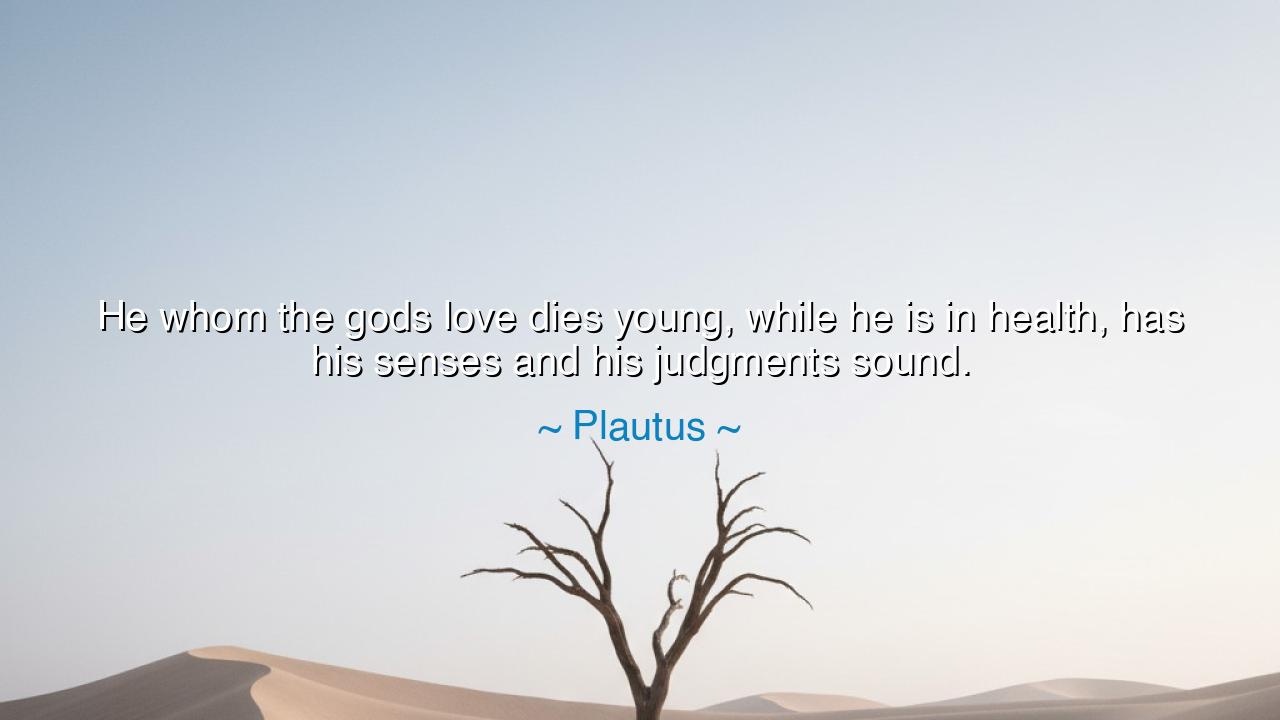
He whom the gods love dies young, while he is in health, has his
He whom the gods love dies young, while he is in health, has his senses and his judgments sound.






In the ancient tongue of Rome, Plautus, the great playwright of laughter and wisdom, once spoke a truth that has echoed through the corridors of time: “He whom the gods love dies young, while he is in health, has his senses and his judgments sound.” At first, these words seem woven with sorrow — a lament for lives cut short. Yet beneath their melancholy surface lies a radiant philosophy: that the gods, in their mysterious mercy, sometimes call home the pure, the noble, the uncorrupted, before the world has the chance to tarnish them.
In this saying, Plautus gives voice to the ancient belief that the divine loves most those whose hearts remain unspoiled by decay or age. The young, in this sense, are not merely youthful in body, but pure in spirit — their judgment still sharp, their health still strong, their virtue still unclouded. To die young, in the eyes of the ancients, was not always tragedy, but a passage before decline — a preservation of the soul at its brightest moment, as a flame that the heavens snatch before it can flicker or fade.
History offers us many such souls — bright meteors that burned across the sky of human life, leaving trails of beauty and loss. Think of Alexander the Great, who conquered worlds before his thirtieth year, and then vanished, leaving an empire without its master. Or John Keats, the poet whose heart overflowed with beauty yet was silenced by death before thirty. Their lives were brief, but their essence was eternal. The gods, it seems, had loved them too much to let them linger in the dust of common years.
To the ancients, there was a kind of divine justice in such fates. The one who dies in his prime departs before bitterness dulls his courage, before corruption touches his heart, before time steals his clarity of mind. The old may live long, but the beloved of the gods live perfectly — their story ending not in decline, but in completion. They are like statues left uncracked, or songs that end on their sweetest note.
Yet, we mortals, bound by love and longing, weep for them. We call their passing unfair, for our hearts cling to presence, not perfection. But Plautus, wise in the ways of both mirth and mortality, reminds us to see through divine eyes. He teaches that there are fates worse than early death: to outlive one’s honor, to see one’s mind decay, to wander life’s end without purpose or peace. Better, he says, to depart when the spirit still shines, when the heart is still clear, when one’s judgment still holds truth.
Consider the ancient warrior who falls in the field, his sword bright with the blood of victory. His body may perish, but his glory remains unstained. Contrast him with the conqueror who survives too long, who sees his strength fail, his empire crumble, his name dragged through the mud of politics and pride. The gods, merciful in their cruelty, spared the first from such ruin. So too, perhaps, they spare the young — not from life, but from the slow dying that comes after its height.
The lesson, then, is not to seek early death, but to seek worthy life — to live in such a way that, should the gods call us early, our hearts are unburdened and our deeds complete. Live with clarity, live with health, live with sound judgment. Let every day be lived as though it were both your first and your last — with vigor, with gratitude, with grace. Then, whether you live long or die young, you will have fulfilled the divine command: to live beautifully, and to die whole.
So, my children, remember this: He whom the gods love dies young, not because life has been stolen from him, but because he has already lived enough to be worthy of eternity. The measure of a life is not its length, but its light. Keep your mind sharp, your heart pure, and your spirit radiant — and should the gods ever call you, they will do so not in pity, but in love. For it is better to depart in full bloom than to linger as a shadow of what once was bright.






AAdministratorAdministrator
Welcome, honored guests. Please leave a comment, we will respond soon